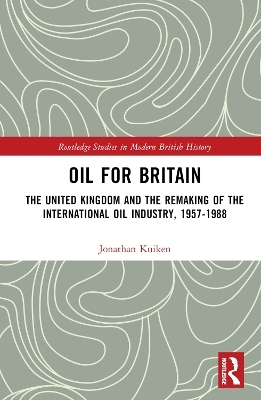
Oil for Britain
Routledge (Verlag)
978-1-032-29114-7 (ISBN)
The period from 1957 to 1988 was transformative for the international oil industry. The United Kingdon, home to two major oil companies, British Petroleum (BP) and Shell, as well as the possessor of large quantities of oil and gas in its territorial waters, was at the heart of this transition.
While famous for its liberal policy toward oil and gas production, both before and after the discovery of North Sea oil and gas, this period actually saw the United Kingdom respond to shifts in power from the major oil companies to the oil-producing states, many of them in Organization of Petroleum Exporting Companies (OPEC), by building up its competency regarding oil matters. This took the form of efforts to influence the activities of BP and Shell abroad as well as in creation of a state-run oil company, the British National Oil Corporation, in an attempt to exercise greater state control over oil and gas production and distribution.
The failure of these efforts was driven in part by internal divisions within Whitehall, the efforts of the oil companies themselves, and ultimately the political will of the Conservative Party under Margaret Thatcher to get the state out of the business of oil and gas.
Jonathan R. Kuiken is an associate professor of History at Wilkes University. He is the author of articles such as "Ignoring, countering and undercutting OPEC: Britain, BP, Shell and the shifting global energy order, 1960–1986" (2020) and ‘La persistence d’empire? Le rôle des compagnies pétrolières britanniques en Afrique postcoloniale’ (2017). He received his doctorate from Boston College in 2013.
Introduction. 1. A more active phase: Upholding the status quo in a changing world of oil, 1957-1962 2. Cartels and Chaos: Declining State and Company Power, 1962-1968 3. Safety in diversity: the search for new sources of oil, 1957-1969 4. Profits Abroad, Taxes at Home: Oil and Britain’s Finances, 1957-1968 5. Participating in Defeat: Shifts in the Balance of Power, 1968-1972 6. Facing Down the “Oil Weapon”: Doomed efforts at consumer cooperation, 1971-1973 7. Partners and Rivals: Battles Abroad, Battles at Home, 1968-1973 8. Britain First?: Weathering the “oil shock” and its aftermath, 1973-1974 9. Oil in the National Interest: The Troubled Birth of BNOC, 1973-1976 10. Preferring to dismember it: Thatcher, the demise of BNOC, and the embrace of a global oil industry, 1978-1988 11. Conclusion
| Erscheinungsdatum | 11.07.2023 |
|---|---|
| Reihe/Serie | Routledge Studies in Modern British History |
| Verlagsort | London |
| Sprache | englisch |
| Maße | 156 x 234 mm |
| Gewicht | 453 g |
| Themenwelt | Geisteswissenschaften ► Geschichte ► Regional- / Ländergeschichte |
| Geschichte ► Teilgebiete der Geschichte ► Wirtschaftsgeschichte | |
| Technik ► Elektrotechnik / Energietechnik | |
| ISBN-10 | 1-032-29114-1 / 1032291141 |
| ISBN-13 | 978-1-032-29114-7 / 9781032291147 |
| Zustand | Neuware |
| Informationen gemäß Produktsicherheitsverordnung (GPSR) | |
| Haben Sie eine Frage zum Produkt? |
aus dem Bereich


